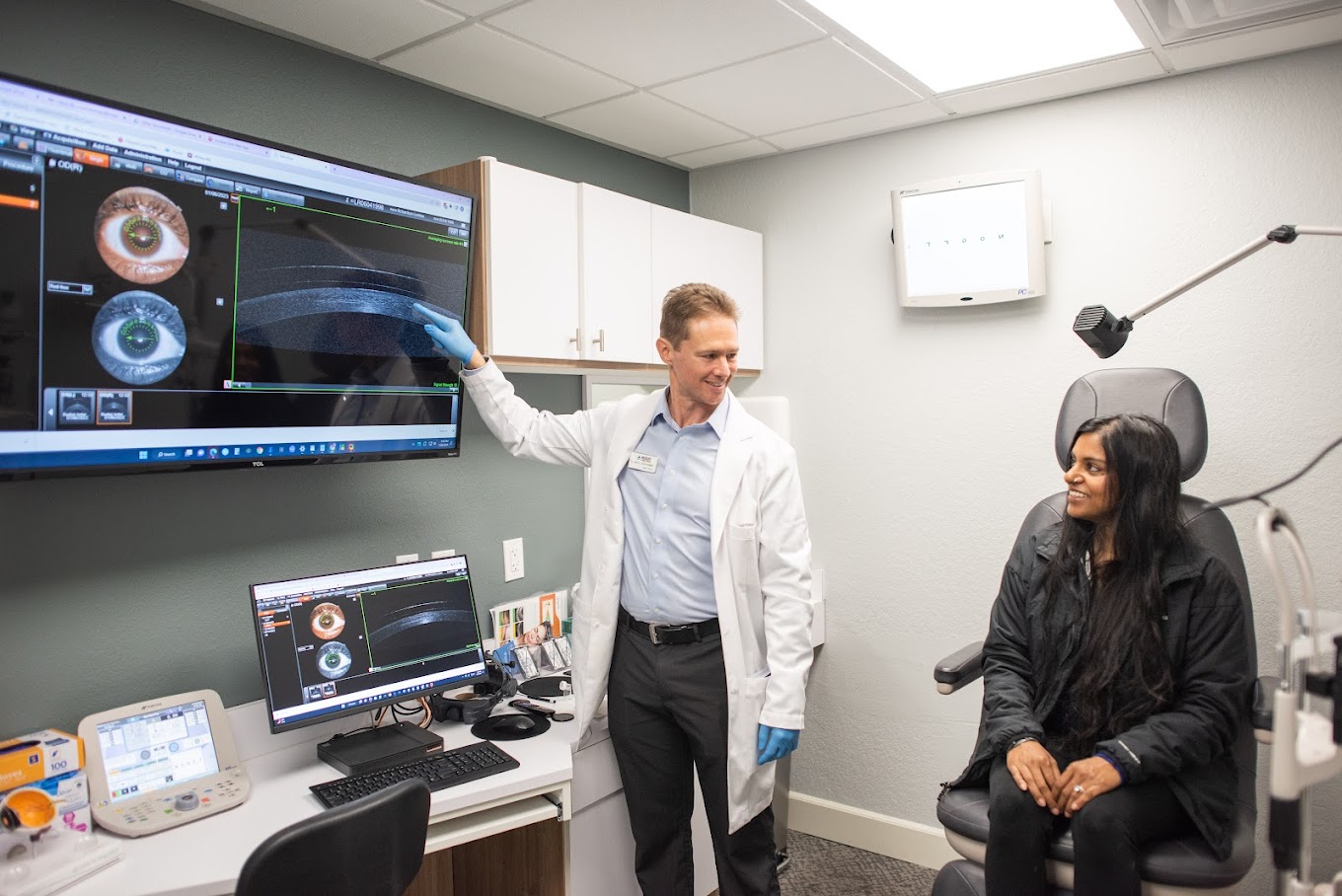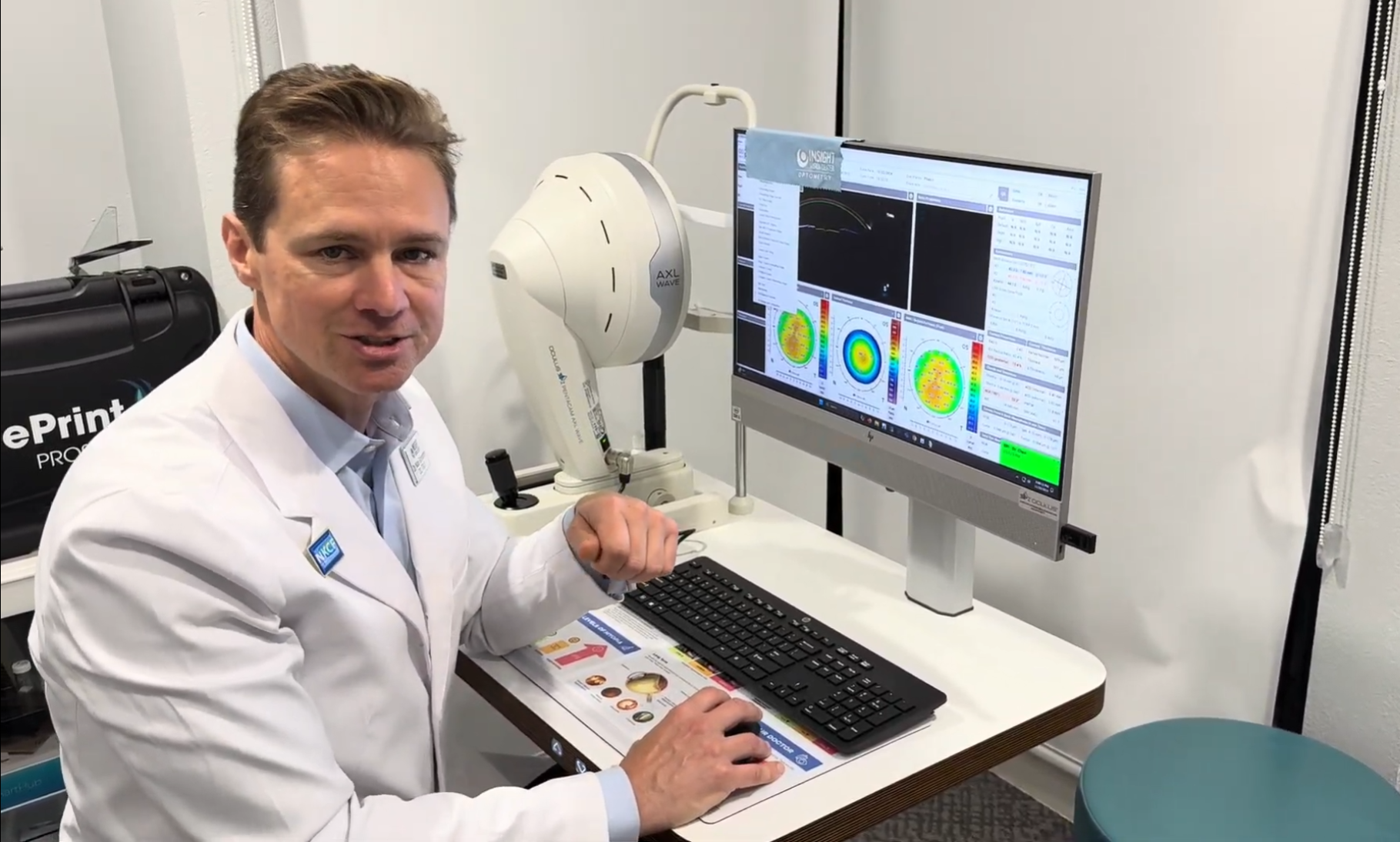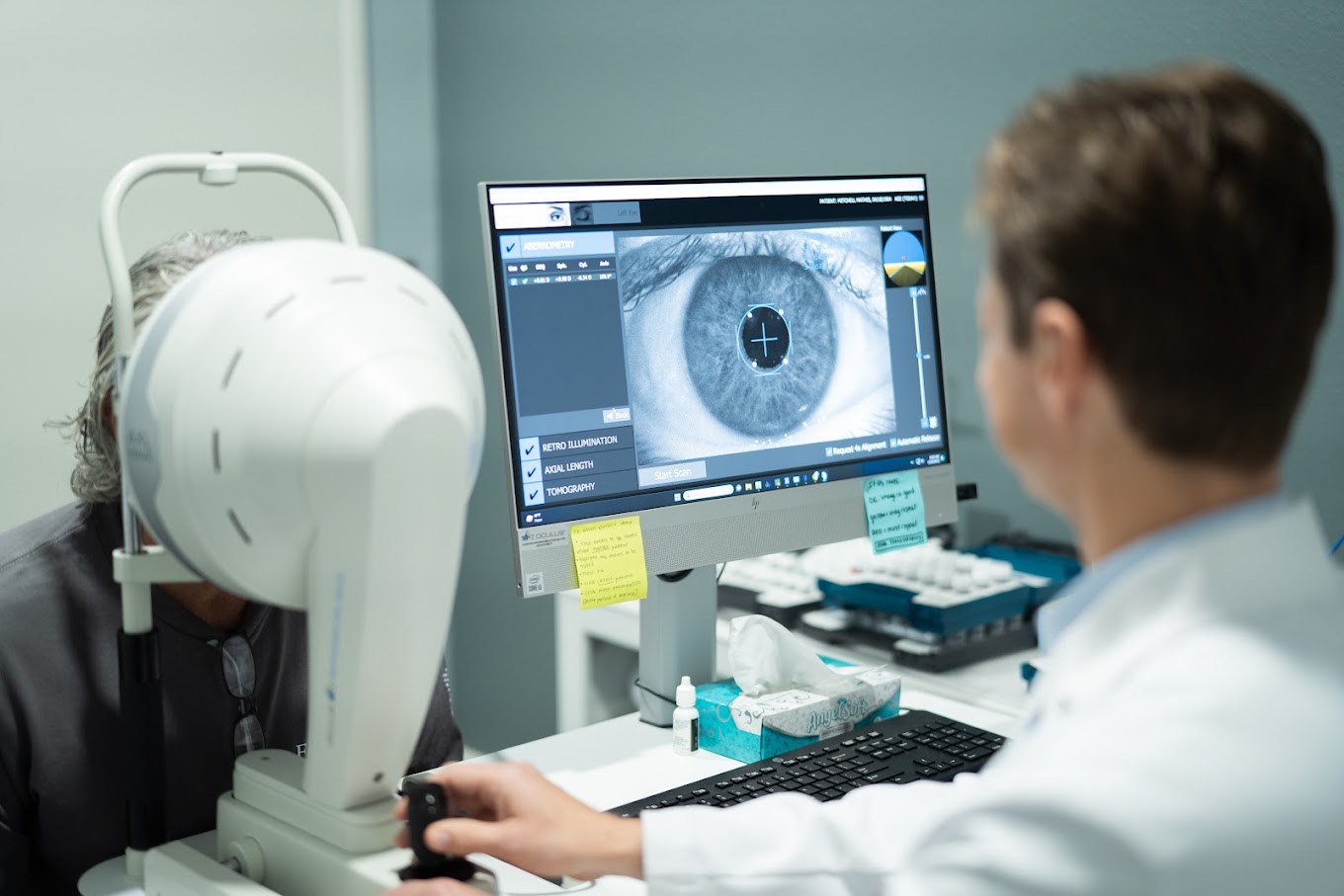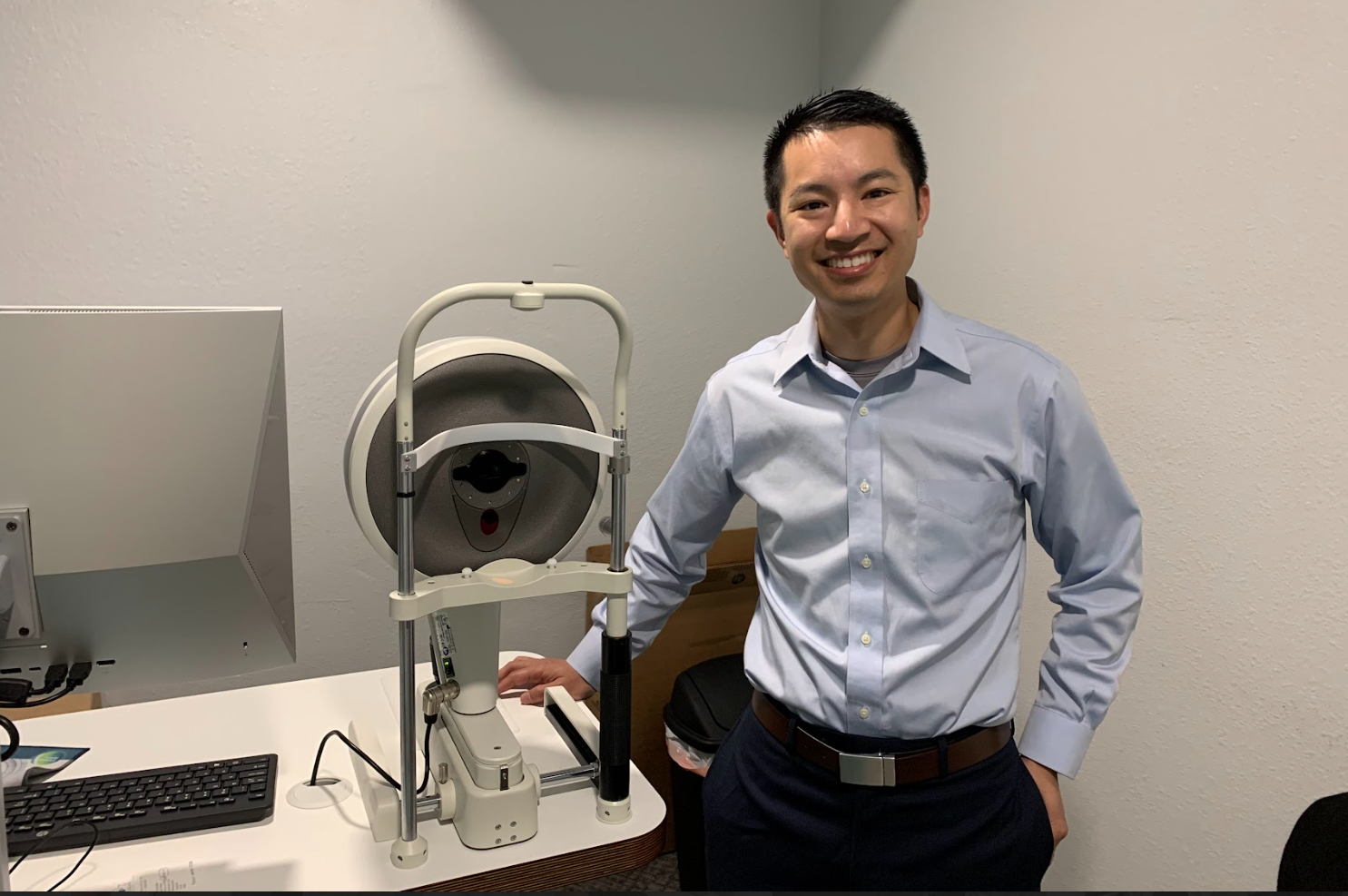
Choosing the perfect contact lenses can significantly enhance your daily life, freeing you from glasses and offering comfort tailored to your needs. At Insight Vision Center Optometry, we emphasize the importance of selecting lenses that align with your lifestyle, prescription, and eye health. Whether you’re new to contacts or looking for specialized options, our eye doctors are here to guide you in the right direction.

Soft Contact Lenses
Soft contact lenses are made of flexible, oxygen-permeable plastics that mold to the shape of the eye. They are widely used because they are easy to wear and adapt to, making them the go-to option for new contact lens wearers.
As of 2019, daily disposable lenses accounted for 38% of all contact lenses prescribed in the United States, with Denmark and Finland leading global daily disposable usage at 71%. Soft lenses are available in different replacement schedules, catering to different lifestyles and budgets.
Daily Disposable Lenses
Daily disposable lenses, often called “dailies,” are single-use contacts meant to be worn once and discarded. They are the most convenient and hygienic type of contact lens, making them an excellent choice for many wearers.
Why are daily disposables so popular?
- They eliminate the need for cleaning, reducing the risk of bacterial infections.
- They are ideal for people with allergies or dry eyes, as fresh lenses daily reduce irritation from deposits.
- They offer unmatched convenience for those who wear contacts only occasionally.
- They reduce complications associated with long-term lens wear, such as corneal ulcers.
One of the biggest advantages of daily disposables is their impact on eye health. Studies have found that 94% of daily disposable wearers comply with lens replacement schedules at a rate of 70% or higher. Compare this to 68% compliance for monthly lens users and just 18% compliance for those replacing lenses every two weeks.
Weekly & Monthly Replacement Lenses
Unlike daily disposables, weekly and monthly lenses require regular cleaning and storage in contact lens solution. These lenses can be more cost-effective but come with a higher risk of buildup of proteins, lipids, and bacteria if not cleaned properly.

Who benefits from weekly or monthly lenses?
- People who wear contact lenses every day and want a cost-effective solution.
- Those who prefer a familiar pair of lenses rather than opening a new pack each day.
- Individuals with specific prescriptions that are not available in daily disposable options.
However, the risk of infection increases if lenses are worn beyond their recommended replacement period. Studies show that many people extend the life of their contacts beyond the suggested timeframe, sometimes doubling their usage before replacement. This significantly increases the risk of eye infections, with a 500% increase in microbial keratitis (corneal infections) among those who over wear their lenses.
Extended Wear Lenses: Sleeping in Contacts—Is It Safe?
Extended wear lenses are designed for continuous use, including overnight wear, for up to 30 days. These lenses are typically made of silicone hydrogel, a material that allows higher oxygen transmission to the cornea. However, even with this advancement, sleeping in contacts carries risks.

Specialty Contact Lenses: Solutions for Unique Vision Needs
While soft contact lenses work well for most people, some require specialized lenses to correct conditions like astigmatism, presbyopia, or irregular corneas. These specialty lenses are designed to provide sharper, more stable vision where standard lenses might fall short. In this section, we’ll explore toric lenses for astigmatism, multifocal lenses for presbyopia, rigid gas-permeable (RGP) lenses, and scleral lenses.
Toric Lenses: Contact Lenses for Astigmatism
Astigmatism occurs when the cornea or lens of the eye has an irregular shape, causing blurry or distorted vision. Unlike regular contact lenses, which have a uniform prescription across the lens, toric contact lenses have different powers in different meridians of the lens to correct this irregularity.
Key features of toric lenses:
- Designed to correct astigmatism by aligning with specific meridians of the eye.
- Available in daily, biweekly, and monthly disposable options.
- Can rotate on the eye, requiring stabilization mechanisms to maintain proper alignment.
Who benefits from toric lenses?
- People with mild to moderate astigmatism who want the comfort of soft contact lenses.
- Patients who need a vision correction alternative to glasses.
- Those who experience distortion or shadowing effects with regular spherical lenses.
Multifocal Lenses: A Solution for Presbyopia
Presbyopia is a natural age-related condition where the eye’s lens loses flexibility, making it harder to focus on nearby objects. This usually becomes noticeable around age 40 and is commonly corrected with reading glasses. However, multifocal contact lenses offer a glasses-free alternative by incorporating multiple prescription zones into one lens.
Types of multifocal lenses
- Simultaneous Vision Design: Contains multiple prescription zones for near, intermediate, and distance vision. The brain learns to adjust focus based on what is needed.
- Translating Design: Functions more like bifocal glasses, where the lens shifts depending on whether the wearer is looking up or down.
- Concentric Ring Design: Features alternating rings of near and distance power.
Who benefits from multifocal lenses?
- Individuals over 40 struggling with near-vision tasks.
- People who want to avoid carrying reading glasses.
- Those who prefer a natural transition between different distances.
Rigid Gas Permeable (RGP) Lenses
Unlike soft lenses, rigid gas permeable (RGP) lenses are made of firm, oxygen-permeable material. While they require a longer adaptation period, they provide sharper, more stable vision—especially for those with high astigmatism or irregular corneas.
Who should consider RGP lenses?
- Patients with high astigmatism and corneal conditions who don’t achieve clear vision with other types of contact lenses.
- People who need crisp, stable vision for work or daily tasks.
Scleral Lenses: The Ultimate Solution for Irregular Corneas
Scleral lenses are large-diameter rigid gas-permeable lenses that vault over the cornea and rest on the white part of the eye (sclera). They are particularly beneficial for patients with irregular corneas or severe dry eye, as they create a fluid-filled reservoir that protects the cornea and provides a new optical surface for clear vision.
Key benefits of scleral lenses:
- Correct vision for patients with keratoconus and post-surgical corneal irregularities.
- Offers superior comfort for people with severe dry eye syndrome.
- Provides long-lasting hydration to the corneal surface.
- Custom designed to your eye
Who should consider scleral lenses?
- Patients with keratoconus who cannot achieve clear vision with standard RGP lenses or toric lenses.
- People with dry eye who find soft lenses uncomfortable.
- Individuals with corneal irregularities such as irregular or high astigmatism and post-LASIK complications.
- People that require excellent vision, such as athletes and first-responders.

Final Thoughts on Specialty Contact Lenses
While soft lenses work for most people, those with astigmatism, presbyopia, irregular corneas, or severe dry eye may need specialty lenses to achieve the best vision possible. Toric, multifocal, RGP, and scleral lenses each have their own unique benefits and require professional fitting to ensure comfort and optimal vision.

Expanding the Role of Contact Lenses Beyond Vision Correction
Contact lenses do more than just correct nearsightedness or farsightedness. Some lenses are designed for cosmetic enhancement, while others provide preventative or therapeutic benefits for specific medical conditions.

The Highest Rated Advanced Eye Care Center In Orange County

What Our Patients are Saying
“I love this office! The staff is so friendly, helpful, and welcoming. Dr. Lam has helped with my dry eye symptoms and myopia and takes the time to explain things thoroughly. I never feel like she is rushing me out of the office to see the next patient. She is extremely knowledgeable and I feel very well cared for. I highly recommend this office!”
⭐⭐⭐⭐⭐
Elaine N.
“More recently I had an issue with super dry eyes and they provided me multiple solutions and care instructions to heal them quickly. What I like is that it’s not all about just solving the issue, they taught me about long term care and what to change to ensure my eyes get the hydration they need.”
⭐⭐⭐⭐⭐
Maria M.
Key Eye Health Tips for Contact Lens Wearers
Regardless of the type of contact lens you wear, proper care is essential to maintaining healthy eyes. Here are the most important guidelines for safe contact lens use:
• Always follow the prescribed replacement schedule.
Wearing contact lenses beyond their intended lifespan leads to bacterial buildup, reduced oxygen permeability, and increased infection risk.
• Never sleep in contact lenses unless specifically prescribed for overnight wear.
Sleeping in lenses dramatically increases the risk of eye infections, as the cornea receives less oxygen while the eyes are closed.
• Use fresh contact lens solution daily—never top off old solution.
Reusing old solution leads to bacterial contamination, which can result in serious eye infections.
• Wash and dry your hands before handling contact lenses.
Avoid using tap water to clean lenses or lens cases, as it may contain harmful microorganisms like Acanthamoeba, which can cause severe eye infections.
• Replace your contact lens case every 1–3 months.
Old cases harbor bacteria and increase the risk of infection.

Finding the Right Contact Lenses for You
With so many contact lens options available, the best choice depends on your vision needs, lifestyle, and overall eye health. Whether you require daily disposables for convenience, toric lenses for astigmatism, multifocal lenses for presbyopia, or scleral lenses for dry eye relief, there is a contact lens designed for you. One thing is certain, you should not settle for contact lenses that do not give you the vision or comfort that you desire. Our eye doctors will help you find the best lens for your needs, so that you can enjoy contact lenses safely, with great vision, and in comfort.

Why Choose Insight Vision Center Optometry in Costa Mesa, CA, for Specialty Contact Lenses?
Insight Vision Center Optometry is a leading eye care clinic in Orange County, specializing in custom and specialty contact lenses for patients with complex vision needs. Whether you’re managing keratoconus, post-surgical corneas, or severe dry eye, our experienced doctors provide personalized solutions using the latest in lens technology.
We take a patient-centered approach, offering comprehensive evaluations and custom fittings to ensure optimal comfort, vision, and eye health. With over 600 positive reviews and a 4.9-star rating on Google and Yelp, we are proud to be a trusted provider of exceptional vision care.
Call us at (714) 942-1361 to book your appointment, or schedule online.





